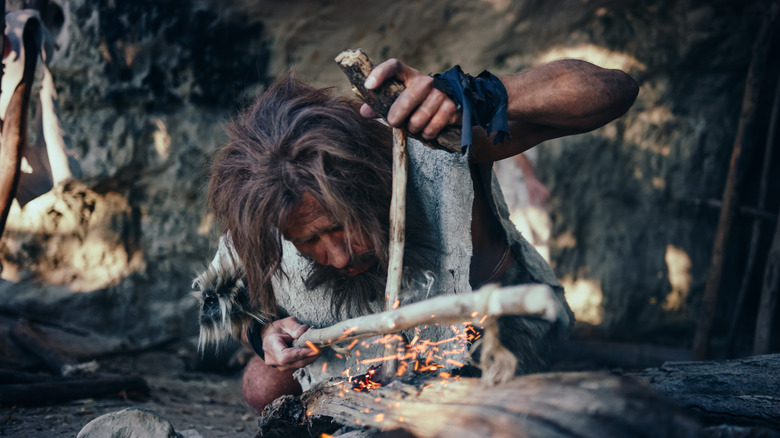Humans Cooked Their Food Earlier Than Previously Thought
Exactly when humans began controlling fire to cook is a controversial issue in science. Some claim that people were taming flames as far back as 1.6 million years ago, but when they did so to cook is another question. Some suggest that our ancestors' expansion into the tundra of prehistoric Europe created an incentive to build hearths to survive. But a 2011 study said that habitual use of fire did not proliferate until between 300,000 to 400,000 years ago, and the ancestor who would have made it to Europe first likely migrated without knowledge of how to control fire (via National Academy of Sciences). This year, a study was released by a team of archaeologists that suggested an earlier date for the control of fire and cooking.
Qesem Cave in Israel held the oldest evidence that established the accepted date range, but evidence for fire-use for cooking only went back 170,000 years. This month, a press release from Tel-Aviv University relayed the discovery of 780,000-year-old carp remains at Gesher Benot Ya'aqov in the Hula Valley region of northern Israel. The study centered on the grinding teeth of the fish, known as pharyngeal teeth, and they found that the crystals that form tooth enamel were exposed to controlled temperatures that caused them to expand, per Science Daily. The study adds to a body of research that suggests our prehistoric ancestors had more advanced cognition than we realize.
The prehistory of human control of fire
Evidence exists of other animals, like birds and cheetahs, taking advantage of fire, either for migration or hunting, but humans stand alone in manipulating fire, whether they use natural fires or create them. Fire use likely began opportunistically when lightning strikes triggered forest fires. Although this is more common in hot, dry areas, northern regions also see forest fires, with Alaska having up to 100 a year. The duration can last about 20 days, making it possible for prehistoric humans as far back as Homo erectus (1.8 million to 110,000 years ago, per Smithsonian) to draw from the infernos over a longer range of time. It's likely that it may have been helpful to deter predators and purge meat of parasites while releasing nutrients (via The Royal Society Publishing).
In 2006, the Campitello Quarry in Florence, Italy yielded evidence that Neanderthals used fire to create a glue with birch bark to adhere stone tools to wooden handles to make spears. But there's no conclusive evidence they made fire, and their fire use is timed with the warmer seasons when natural fires would have occurred (via BBC Earth). It's possible that humans cooked, however, even before they could make fire. Studies suggest that decreased jaw sizes over time and the enlargement of our prefrontal cortex could have been the result of cooking. In fact, some archaeological sites with burnt bone fragments hint that Homo erectus cooked meat, but otherwise, there's little direct evidence that this was a regular practice (via New Scientist).
Implications of the new discovery
Homo sapiens go back 200,000 years, according to paleoanthropologists, so the cooking of meat dating back 780,000 years reveals that earlier hominin species had similar reasoning skills to ours. At the time, Homo heidelbergensis (the common ancestor of Neanderthals and us) inhabited Europe and other parts of the world, and Homo erectus was also roaming the planet. Furthermore, in 2004, an Israeli site in the same region as the recent find contained flint altered by fire and the tools associated with H. heidelbergensis, as per Smithsonian. Some scientists claimed the burn patterns on flint tools proved they could make fire, but this is a contested claim (via Reuters).
While the current study adds to the chronicles of the human story, it still doesn't say conclusively if human ancestors were making fire so long ago. Nevertheless, it tells us that hominins of that period understood the importance of cooked food. Professor Goren-Inbar, who was involved with the 2004 study and the current one, said (via Science Daily), "Gaining the skill required to cook food marks a significant evolutionary advance, as it provided an additional means for making optimal use of available food resources. It is even possible that cooking was not limited to fish, but also included various types of animals and plants."


